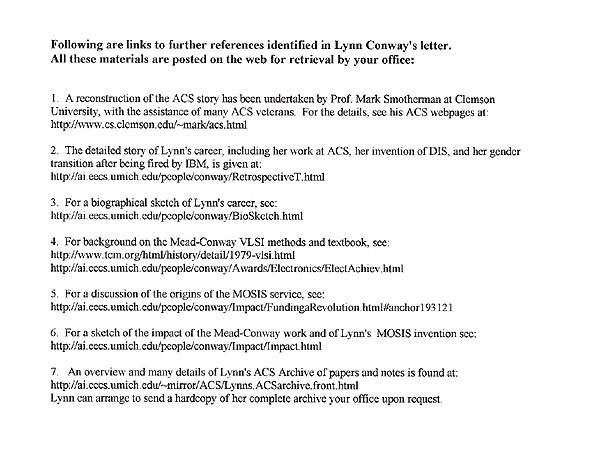- Record of my phone conversation with Mr. Dan O'Donnell,
- Secretary of the IBM Corporation,
- August 22, 2000
-
-
- The 8-22-00 call involved me and Dan O'Donnell and an attorney
present in Dan's office. Mr. O'Donnell referred to me as "Prof.
Conway". I called him "Dan".
-
- O'Donnell referred to my original letter, and to some initial
confusion about the dates - since it was dated March 22, but
relayed to Lou Gerstner much later, Lou had originally wondered
if it had gotten stalled within IBM. We sorted that all out as
a non-problem.
-
- O'Donnell then focused immediately on "the three points"
near the end of my letter (see above):
-
-
- 1. The issue of declassification of my IBM-ACS archives:
-
- O'Donnell said "IBM would grant me a worldwide
license to distribute my ACS archives for scholarly purposes
as long as the disclaimer was included indicating that the documents
had been declassified by IBM - - ".
-
- I thanked him for that.
-
-
- 2. The issue of support for the historical reconstruction
of the ACS project:
-
- O'Donnell said that IBM was going to support an internal
effort to document and reconstruct the ACS project, and that
it would be led by Ed Sussenguth.
-
- I immediately said that such an effort was unlikely to be
seen as a serious scholarly effort by outsiders, and that it
would be ever so much more useful to support outside groups like
CBI and TCHM to do that.
-
- Dan showed strong signals of resistance to my reaction -
indeed, a certain stiffness - he clearly didn't like my immediate,
assertive suggestion that their plan was not a good one. I guess
he wasn't used to having people question his decisions.
-
-
- 3. The issue of IBM expressing regrets over their past
actions:
-
- This was the most important part of our interaction and the
only truly serious issue to be covered.
-
- O'Donnell said that "IBM had agonized over this one
- - ".
- [I wondered what he meant by that (and I still wonder)].
-
- Then O'Donnell said that
- "The IBM he'd always known was a wonderful company that
always treated people very fairly - - ".
- [Hmm. This sounded like he thought that IBM hadn't fired
me. Or perhaps he thought that I was fired "fairly"].
-
- I asked him: "Do you mean that you doubt that they fired
me?"
- O'Donnell said, "no - it's just that we don't have any
records that that happened".
I said "well, I have very detailed records, and there are
plenty of witnesses to what happened - that can all easily be
confirmed - so do you really doubt that it happened the way I
said it did?"
-
- He paused - and then said "Prof. Conway, WE'VE decided
that the best thing to do" - - pause -
- "is to put this all behind us and just go forward from
here - - "
-
- I was absolutely stunned at this statement!
It was almost unbelievable that he could dismiss me so cavalierly
- -
-
- I thought: Best for who? Sure, it's best for IBM - they don't
take any responsibility for anything that way. But what about
me? They're saying, hey, what's past is past - let's forget about
it and move on.
-
- Sure, THEY'd like to forget about it, just like all criminals
would like to forget about their crimes.
- But I can't forget about it! Especially now that they're
brushing me off this way!
-
- So, I said something like "well of course YOU'D like
to move forward, and put it behind - - "
-
- I then asked again if he could "at least see if we can
get IBM to support OUTSIDE groups on reconstructing
- the ACS history - at least that way the full accomplishments
of the team might be recognized in the long term - let's be sure
to do that".
-
- He did not reply to that,and the conversation was over.
- All I was left with were O'Donnell's words ringing in my
ears:
-
- "Prof. Conway, we've decided that the best thing
to do" - - pause -
- "is to put this all behind us and just go forward
from here - - "
|





